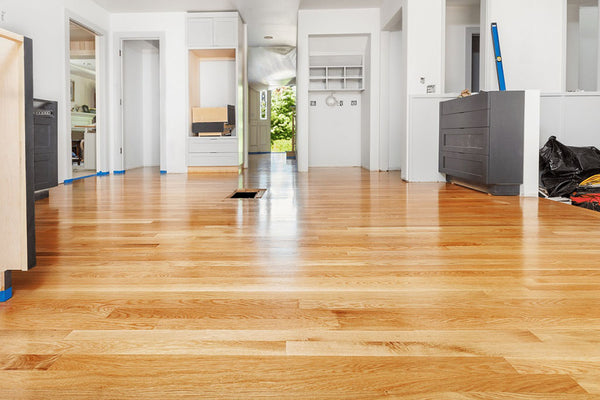Flooring is an important element in any home or commercial space, and it plays a significant role in enhancing the aesthetic appeal of the premises. The flooring material you choose can vary according to your preferences, but it is important to take good care of it to ensure its longevity. Proper maintenance of your flooring can keep it looking fresh and new for years to come. In this blog, we discuss the importance of cleaning and maintaining your flooring and tips to ensure longevity.
Why Cleaning And Maintaining Your Flooring Is Important

The daily wear and tear can take a toll on your flooring. If not properly maintained, dirt, debris, and moisture can seep into the flooring material and cause long-term damage. Stains, scratches, and scuff marks can degrade the flooring's appearance, making it look old and worn out. Furthermore, poor maintenance can significantly decrease the lifespan of floors, requiring expensive replacements that could have been avoided with preventative measures.
Tips To Ensure the Longevity Of Your Floor
Whether you have hardwood, tile, carpet, or vinyl flooring, maintaining it requires regular cleaning and upkeep. Here are some tips that can help you keep your flooring in perfect shape.
Clean spills immediately: A spill can seep into the flooring material, resulting in a stain. It is critical to clean up any spills immediately to minimize any long-term damage.
Vacuum or sweep regularly: Regular sweeping and vacuuming can help you remove dirt, dust, and debris that may cause scratches or stains. This also helps in avoiding unnecessary wear and tear on your flooring.
Use gentle cleaners: Harsh cleaners can scratch or damage various types of flooring. Instead, use specialized cleaning products that are designed for your specific flooring.
Avoid excess water: Water can seep into several types of flooring and cause damage. It's always best to use a damp cloth when cleaning instead of dousing the floors with water.
Furniture placement: Placing furniture correctly can prevent scratches, marks, and indentations from heavy objects. Use pads and other protective material under furniture to avoid damage to your floors.
Regular professional cleanings: Getting a professional cleaning can restore your flooring's look and ensure it remains in tip-top shape for longer. Professional cleaning supports deep cleanings that are much harder to accomplish on your own.
In conclusion, cleaning and maintaining your flooring is essential in ensuring its longevity. Simple preventative measures like sweeping daily, using gentle cleaning products, placing furniture correctly, and getting professional cleanings can extend the life of your flooring significantly. Take good care of your flooring to improve its aesthetic beauty, durability, and longevity.
What Are Some Common Mistakes People Make When Cleaning Their Floors, And How Can You Avoid Them?

- Not sweeping or vacuuming before mopping - This can push dirt and debris around, leading to streaky or uneven floors. To avoid this, always sweep or vacuum thoroughly before mopping.
- Using too much water or cleaner - Overwetting the floors can damage them, causing warping or discolouration. Be sure to follow the manufacturer's instructions for the amount of cleaner and water to use.
- Not rinsing properly - Leaving residue from cleaners or soap on the floors can cause buildup and damage over time.
- Using the wrong cleaning products - Different types of flooring require different cleaning products. Consult the manufacturer's instructions or a flooring specialist to find the best cleaner for your specific type of flooring.
- Scrubbing too hard or using abrasive tools - This can scratch or damage the floors. Use soft cloths or mop heads and gentle pressure when cleaning.
- Not drying floors completely - Leaving floors wet can lead to water damage or mould growth. Use a dry mop or towel to carefully dry the floors after cleaning.
- Not using entrance mats - Placing mats at the entrances can help reduce the amount of dirt and debris tracked in and minimize the need for frequent
How Can You Remove Stains And Spills From Your Floors Without Causing Damage?

- Blot spills immediately: Always try to clean up any spills or stains as soon as possible to prevent them from setting into the floor. Use a clean cloth or paper towel to blot the spill and remove as much liquid as possible.
- Use a gentle cleaning solution: Mix a few drops of mild dish soap or vinegar with warm water and use a clean cloth or mop to clean the stained area gently. Avoid using harsh chemicals or abrasive cleaners that can damage the floor.
- Test the cleaning solution: Before applying any cleaning solution to your entire floor, test it on a small, inconspicuous area to ensure it doesn't cause any damage.
- Try baking soda paste: If you have tough stains that won't come out, try making a paste of baking soda and water and apply it to the area. Let the paste sit for a few minutes before scrubbing and rinsing off.
- Rinse thoroughly: After cleaning the floor, rinse thoroughly with a damp mop to ensure all cleaning product residue is removed.
- Dry the floor: Use a clean, dry towel or mop to remove any excess water and ensure the floor is completely dry after cleaning.
- Prevent future stains: Place mats or rugs in high-traffic areas to prevent future stains and spills. Avoid wearing shoes on the floor as they can track in dirt and stain the floor.
What Are Some Factors That Can Affect The Longevity Of Your Flooring, And How Can You Combat Them?
The longevity of flooring can be affected by several factors, such as its materials, installation technique, exposure to moisture, foot traffic, and maintenance. For instance, hardwood flooring can last for more than 100 years with proper maintenance, while carpets may need to be replaced after 8-10 years due to wear and tear. High humidity, spills, and moisture can warp and stain wood, cause tiles to crack or mould, and generate foul odors from carpets. Similarly, heavy foot traffic, pets, furniture, and sharp objects can scratch, dent, or damage any flooring over time. The best way to combat these factors is to choose durable materials that match your lifestyle and budget, hire professional flooring experts who use quality installation methods and products, monitor moisture levels, use mats or rugs to absorb spills and clean the floor regularly with appropriate cleaning agents and equipment. Additionally, it is recommended to schedule periodic inspections, repairs, or replacements to avoid irreversible damage and ensure the longevity of your flooring.
Final Thoughts On Maintaining Your Flooring For Longevity

In conclusion, proper cleaning and maintenance of your flooring are vital for maximizing its longevity and ensuring that it looks great for many years to come. By following the helpful tips and advice outlined in this blog, you can keep your flooring looking like new while protecting it from damage and wear. From simple measures like regular sweeping or vacuuming to more involved tasks like deep cleaning or refinishing, there are many steps you can take to maintain your flooring and keep it in top condition. So why wait? Start implementing these best practices today and enjoy a beautiful, durable floor for years to come.
Other flooring blog articles you may want to read:
How to Best Protect Flooring From Indoor Plants
Common Flooring Installation Mistakes To Avoid
